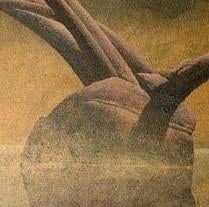Progarchives.com has always (since 2002) relied on banners ads to cover web hosting fees and all.
Please consider supporting us by giving monthly PayPal donations and help keep PA fast-loading and ad-free forever.
| Author |
 Topic Search Topic Search  Topic Options Topic Options
|
liquidtheater 
Forum Groupie


Joined: July 06 2005
Status: Offline
Points: 71
|
 Posted: March 04 2006 at 21:20 Posted: March 04 2006 at 21:20 |
 Yanns wrote: Yanns wrote:
Quick rundown of the modes people are talking about here:
Ionian: Major Scale
Dorian: b3 and b7
Phrygian: b2, b3, b6, b7
Lydian: #4
Mixolydian: b7
Aeolian: b3, b6, b7 (the minor scale)
Locrian: b2, b3, b5, b6, b7
As for my favorite, it depends on the situation. For instance, I love jamming in Ab lydian, but I enjoy C locrian too, etc. etc.
|
no no no, most guitarists dont really realize what a mode is,sure those are the intervals but harmonicly your wrong. the best way to understand modes is to actually hear them. Now an example is say you are playing a C major scale(C "ionian") over a C major chord in this situation you are in C ionian but if you play a C major scale over an E minor chord you are now playing in E phrygian its a total change in feel and sound it all has to do with harmony.
and by the way aeolian is natural minor and phrygian and dorian are also minor, lydian is also major, mixolyidian is dominant, and locrian is half diminished
|
|
Dream Sequencer System Offline
|
 |
MikeEnRegalia 
Special Collaborator


Honorary Collaborator
Joined: April 22 2005
Location: Sweden
Status: Online
Points: 21846
|
 Posted: March 05 2006 at 02:32 Posted: March 05 2006 at 02:32 |
^ mixolydian is also major.
As I said above: If you know all that and find the scales boring: Try to use the harmonic minor scale instead of the natural minor scale: apply A harmonic minor to the chords based on the notes of that scale. You will get many weird chords AND many weird scales to play around with.
|
|
|
 |
Rising Force 
Forum Senior Member

Joined: January 09 2006
Status: Offline
Points: 439
|
 Posted: March 05 2006 at 04:01 Posted: March 05 2006 at 04:01 |
 MikeEnRegalia wrote: MikeEnRegalia wrote:
^ mixolydian is also major.
As I said above: If you know all that and find the scales boring: Try to use the harmonic minor scale instead of the natural minor scale: apply A harmonic minor to the chords based on the notes of that scale. You will get many weird chords AND many weird scales to play around with. |
haha, I was learning about that in my guitar lesson today. Yes, the possibilities are infinite.
|
 |
Rosescar 
Forum Senior Member


Joined: October 07 2005
Status: Offline
Points: 715
|
 Posted: March 05 2006 at 15:08 Posted: March 05 2006 at 15:08 |
|
Scales are a tool, but there's no reason to freak out if you're not
playing in them. I, for one, use some mix of the normal do re mi scale,
pentatonic scale, and a more or less blues scale in my soloing. I
usually just do free-form though :p
|
My music!
"THE AUDIENCE WERE generally drugged. (In Holland, always)." - Robert Fripp
|
 |
Soulman 
Forum Senior Member

Joined: January 22 2005
Status: Offline
Points: 290
|
 Posted: March 05 2006 at 22:31 Posted: March 05 2006 at 22:31 |
 cobb wrote: cobb wrote:
Playing lead is playing a melody. ie the guitar takes over from the vocal (if they are there). Singers usually know very little about scales, they just put something that sounds good over a series of chords. Any lead instrument should do the same. Sticking with scales and arpeggios will make it sound technically good, but it will make for a boring melody. As long as you know the 'distance' between any two notes in a given scale, you can play what you want. A fair percentage of those who can play exceptional lead do not know much about music theory (this is particularly the case with guitarists), but they can hear when any note sounds 'right'. Music theory, scale and arpeggio practice is important, but on the guitar, not that necessary for playing good lead, as long as you can hear when you play a wrong note. Just put on things that have common chord progressions and jam along. Getting together with other musicians will help greatly in learning how to jam, as well. The more you practice, the more you gain your own patterns and runs that work. |
Well that's quite encouraging for me, since I know the seperation between intervals on notes on the fretboard and I do enough music theory to make me somewhat competent...and I'm a singer! Though the reason why I started this thread was to find some way to help me jam out better. I guess it all really comes from experience. My jamming abilities are increasing though as I'm listening to different bluesy records to get ideas. I'm still not as good as some of the bluesy players that play, but I think I'm alright not great though. Definetely I think learning any instrument is like a trade, only experience will make you better (...mostly through practicing songs etc.). I've only been playing for about 2 years now, so I've got a long way to go.
|
|
~~~~~~~~~~~~~~~~~~~~~~~~~~~~~~~~~~~~~~~~~~~~~~~~~~
"Don't Kill the Whale, Dig it Dig it" - Jon Anderson
I shall live by those words all my life Jon
|
 |
Donate monthly and keep PA fast-loading and ad-free forever.
/PAlogo_v2.gif)


